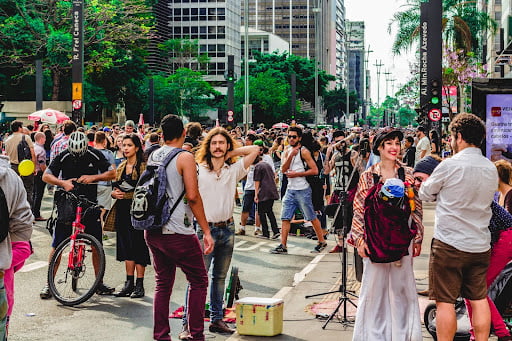Tourists who are not cautious can become easy targets for thieves due to their noticeable presence in crowded areas, lack of familiarity with surroundings, and carrying valuables. Minimize the risk of being mugged or robbed by implementing a few precautionary measures. I don’t think there’s any need to explain the importance of personal safety abroad, so let’s move on to traveling tips.
Best Safe Travel Practices
#1 Don’t stand out in a crowd
Here are some tips to consider while traveling:
- Walk with confidence, even if you’re unsure of your destination.
- Adapt your clothing style to match that of the locals, avoiding typical tourist attire such as a vibrant shirt paired with a camera around your neck.
- Maintain discretion while navigating with a map.
- Stay aware of your surroundings and exercise caution if someone appears excessively interested in you.
#2 Learn about the main methods of fraud
No matter where you wander, there will always be individuals eager to swindle you out of your hard-earned money. While some may be easy to spot, there are also cunning artists lurking in the shadows. Many believe they are too clever to fall for scams, but it can happen to anyone.
Below are a few of the most prevalent travel scams I’ve encountered. It is advisable to familiarize yourself with them and conduct further extensive research on the most notorious scams specific to your destination using reliable sources like Google.
Advice! For stress-free travel, try to find entertainment for yourself during periods of travel and relaxation in a hotel. The first thing that comes to mind is to install Netflix on your TV, smartphone, or laptop. But you need to consider regional restrictions. Do you know how to change the Netflix region? You need to use VPN services that offer IP addresses from other countries. VeePN works perfectly, you can start your search from there.
#3 Emergency preparedness
It is crucial to be well-prepared for unexpected situations, even if their likelihood is low. Memorizing local emergency contact numbers and familiarizing yourself with the location of your country’s embassy or consulate are important steps. Upon arrival, registering with your embassy is recommended to receive up-to-date information and assistance if required. Learning basic phrases in the local language can greatly aid in navigating emergencies and seeking help.
To ensure your safety during emergencies, it is essential to follow the guidance provided by “Travel Safe Travel Smart” and equip yourself with the necessary resources and knowledge.
#4 Don’t carry valuables with you
To minimize the chances of theft while traveling, it is important to consider the vulnerability of valuable belongings. Despite the assumption that locked or zippered backpacks provide sufficient security, determined thieves can easily slash or force open them. It is crucial to remain vigilant and constantly keep an eye on personal belongings to prevent theft unnoticed. For added precaution, it is advisable to use a backpack as a pillow during train or bus journeys known for theft incidents. Additionally, attaching a thin cable to secure the backpack to a seat can provide an extra layer of protection.
#5 Ask Locals For Advice
To determine the safety of neighborhoods, seek guidance from residents. They are typically friendly and proficient in warning about hazardous areas. However, it is advisable to validate information received from strangers, as they may lack accurate knowledge or have malicious intentions. Local forums will help you with this. But be careful when visiting them and use a VPN (check here) to avoid getting a virus. It is especially important to use a VPN when using public Wi-Fi.
The reliability of taxi drivers in providing useful information varies. While some are excellent sources of valuable insights, others may lead you astray due to their unpleasant demeanor.
#6 Digitize important documents

To prevent potential exploitation by criminals, it is important to leave unnecessary items, such as your Social Security card, at home. Instead, carry copies of essential documents like prescriptions and a backup credit card to facilitate digital purchases in emergencies. Additionally, it is advisable to take pictures of these documents and upload them to a secure web folder. This proactive measure enables you to swiftly minimize harm in case of theft. If required, promptly contact your bank to cancel your debit and credit cards and inquire about obtaining a new ID from the embassy. For added security, consider utilizing a trusted digital vault system like 1Password or LastPass to store your confidential information.
#7 Let trusted people know about your route
When traveling, whether alone or with others, it is important to inform a trusted individual about your itinerary. Regularly check in with them to update them on your whereabouts, ensuring your safety. Additionally, create and share a unique safe word with your family or friends, enabling them to recognize a distressing situation, even if it appears ordinary to others who might be listening. For an extra level of security, consider sharing your live location using your smartphone with a trusted friend or family member.
Conclusion
The stress of going beyond the norm is a common occurrence among travelers. However, you will calm down very quickly when you see that everything is going according to your plan. For everything to happen exactly like this, you need to carefully prepare for the trip. The measures listed will help you overcome stress.




